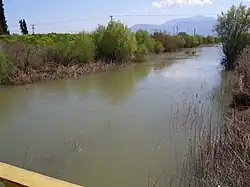Cephissus (Boeotia)
The Cephissus (Ancient Greek: Κήφισσος), called the Boeotian Cephissus to distinguish it from other rivers of the same name, or Kifisos (Greek: Βοιωτικός Κηφισός) is a river in central Greece. Its drainage basin is 1,958 km2 (756 sq mi).[1] In Greek mythology, the river god Cephissus was associated with this river. The river rises at Lilaia in Phocis, on the northwestern slope of Mount Parnassus. It flows east through the Boeotian plain, passing the towns Amfikleia, Kato Tithorea and Orchomenos. It drained into Lake Copais, which was therefore also called the Cephisian Lake,[2] until 1887, when the lake was drained. An artificial outflow has been created to Lake Yliki (ancient Hylice), further east.[3]
| Boeotian Cephissus | |
|---|---|
 | |
| Native name | Βοιωτικός Κηφισός (Greek) |
| Location | |
| Country | Greece |
| Physical characteristics | |
| Mouth | |
• location | Lake Yliki |
• coordinates | 38°25′56″N 23°14′43″E |
| Basin size | 1,958 km2 (756 sq mi) |
_river_map.jpg.webp)
Pausanias records a Theban tradition that the river Cephissus formerly flowed under a mountain and entered the sea until Heracles blocked the passage and diverted the water into the Orchomenian plain.[4] Pausanias also says that the Lilaeans on certain days threw cakes and other customary items into the spring of the Cephissus and that they would reappear in the Castalian Spring.[5]
The Cephissus valley is of strategic importance, connecting northern Greece via the passes of Mount Oeta and Mount Kallidromo (including Thermopylae) to southern Greece and the Gulf of Corinth.[3] As a result, in the Frankish period a chain of forts and watchtowers was established along its course by the rulers of the Duchy of Athens.[3]
References
- "Preliminary Flood Risk Assessment" (in Greek). Ministry of Environment, Energy and Climate Change. p. 61. Archived from the original on 15 February 2020.
- Pausanias, Description of Greece 9.24.1
- Koder, Johannes; Hild, Friedrich (1976). Tabula Imperii Byzantini, Band 1: Hellas und Thessalia (in German). Vienna: Verlag der Österreichischen Akademie der Wissenschaften. p. 187. ISBN 3-7001-0182-1.
- Pausanias, Description of Greece 9.38.7
- Pausanias, Description of Greece 10.8.1